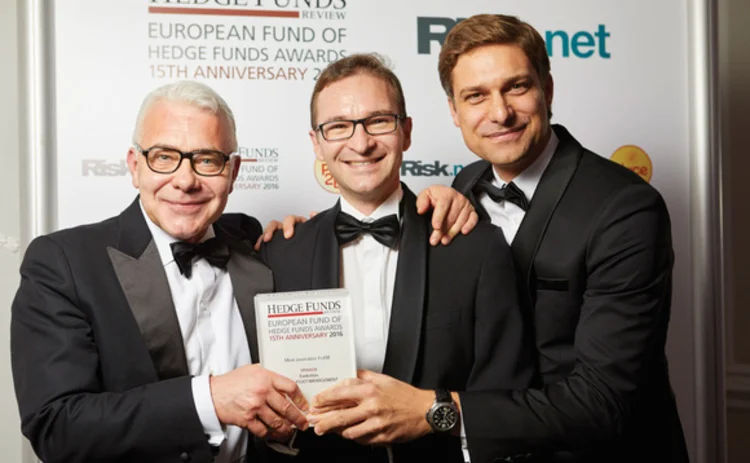
Most innovative FoHF: Evolution (Lyxor Asset Management)
Alternative multi-manager fixed-income fund offers exposure to diversified performance drivers

European Fund of Hedge Funds Awards 2016
Real innovation within the fund of hedge funds world is rare. With Lyxor's Evolution fund, the asset manager has produced a structure that works within a Ucits format and address the challenges faced by struggling traditional fixed-income long-only funds. "The fund enables investors to get exposure to five well-established industry players specialised in fixed-income management in a cost-efficient wrapper," says Alexandre Labbe, co-head of global portfolio management in Europe and the portfolio manager of Evolution.
Labbe points to Lyxor's long track record of working with hedge funds and its ability to access good managers. This has paid off in Evolution, with the fund providing diversified exposure to five well-known fixed-income and credit strategies.
The Goldman Sachs Strategic Macro Bond strategy primarily invests in government and investment-grade bonds and aims to provide exposure beyond traditional asset classes by using a top-down/bottom-up investment strategy across global fixed-income and currency markets.
Finisterre Emerging Market Debts strategy seeks to generate medium- to long-term positive gains, combining current income and capital appreciation by investing in emerging market sovereign and corporate debt in local and hard currency, and foreign exchange.
Muzinich Long Short Credit Yield strategy seeks to deliver risk-adjusted returns using a long/short credit strategy focusing on relative value opportunities across the US and European corporate credit markets with an emphasis on high-yield corporate bonds.
Pimco's Mortgage Absolute Return Strategy is an absolute return-oriented mortgage-backed securities (MBS) strategy fund focused on best ideas across agency MBS relative value (long/short strategies), opportunistic mortgage credit (non-agency MBS, commercial mortgage-backed securities, European asset-backed securities and mortgage derivatives. The fund aims to be value-oriented, contrarian and a liquidity provider using risk factor diversification across interest rate and credit-sensitive global MBS.
The fund enables investors to get exposure to five well-established industry players specialised in fixed-income management in a cost-efficient wrapper
Alexandre Labbe
The fifth strategy is Epsilon Fixed Income and Currencies, a trend-following strategy focused on fixed-income and currency markets. It is primarily invested in futures contracts, rates, bonds and currencies, covering all the main markets, and aims to generate absolute returns over the medium to long term with low correlation to traditional bond portfolios.
These five strategies are bundled together in a Ucits format with daily liquidity. Not only does Evolution provide investors with access to a range of bespoke alternative strategies in fixed income, credit and foreign exchange, it gives exposure to fixed-income arbitrage, long/short and trend-following strategies that traditional long-only fixed-income products cannot offer.
The combination of strategies offers investors exposure to a mix of diversified performance drivers in a product tailored to the asymmetric risk universe.
The fund is passported into 10 countries and available on Lyxor's Alternative Ucits Platform in US, Hong Kong and Singapore dollar classes as well as in euro, sterling, yen and Swiss franc.
Expected return of the Ucits product is Libor plus 3–4% over the medium term, net of fees. The structure is an Irish-registered Ucits fund. The institutional share class charges a 1.2% management fee and there is no performance fee.
The ability of Lyxor to combine the five managers was no mean feat. Some small adjustments were needed for each of the five strategies due to the investment restrictions imposed by Ucits and managed accounts. This may give some tracking error to the benchmark strategies but should produce performance close to the equivalent '40 Act and Ucits funds run by some of the managers.
"It is important to be flexible and reactive and to be invested in managers who actively manage their positions because interest rates are rising in the US and in Europe. Being static in just long-only funds is problematic and there are asymmetric risks associated with that positioning," explains Labbe.
He believes it is important to be active and manage exposure in the fixed-income area. "The risk to the investor if they are not in an actively managed fund is that they take unwanted or unexpected risk through, for example, exposure to one instrument in high yield or emerging markets," he adds.
Balancing act
Participation in actively managed funds ensures the risk is well balanced, and exposure is diversified and in line with market conditions. Evolution also gives investors cover for the full spectrum of fixed-income asset classes while remaining diversified. Each of the five managers trades a specific segment of the market. The transparency of the managed account structure gives Lyxor see-through to position level so it can monitor risk exposure and actively manage the portfolio, if needed, to reduce the weighting for each manager allocation.
At present, Evolution has a 10% allocation for the commodity trading adviser (CTA) component, as this strategy targets a higher level of volatility than the other four strategies. The remaining four account for 20–25% of the portfolio.
This is how the portfolio allocates between the five managers under normal market conditions. But because the portfolio is actively managed, if Lyxor sees an investment opportunity in, say, high yield, it can increase the weighting there. The same would apply to emerging markets.
Conversely, if the environment changes and it is likely that rates will increase, Lyxor can reduce overall duration, away from managers that have the highest level of duration.
"This is how we expect to implement allocation changes. All the stress tests worked before launch are based on our initial allocation. We expect few allocation changes under normal market conditions," says Labbe.
If funds all started to underperform at the same time and there were negative returns coming from fixed income overall, this could lead to allocation changes. Most likely, in such a scenario when all five strategies were losing, Lyxor would increase the level of cash in the portfolio.
If there were a specific event to one segment of the fixed-income asset class, such as high yield of emerging markets, Lyxor could reduce the weighting in one or more manager. Addressing an event specific to one aspect of fixed income would help protect capital and reduce risk.
As Lyxor has full transparency, it knows exactly how each sub-fund is positioned. It can rely on its own team of analysts as well as the individual portfolio managers to decide whether or not to implement allocation changes.
Such changes can be done daily if needed although redemption notices are daily with a five-business-day notice.
We are always trying to assess how the portfolio would react if everything went wrong. We’ve seen episodes where things do go wrong and the portfolio reacted well
Alexandre Labbe
While most of the big risks when investing in funds – independent valuation, risk monitoring, investment restrictions – have been addressed by the full transparency and daily liquidity, there may be some unforeseen risks moving into 2017. "The most difficult risk to address is that of performance. We think we have covered this by carefully selecting managers that give us diversification through different strategies. Any disappointing performance is discussed both internally and with managers," notes Labbe.
Admitting it is easier to comment in hindsight, Labbe admits there are periods when fixed-income investing is more challenging. Over the past couple of years, fixed income has seen rate temper tantrums, significant weakness in high-yield markets and extreme weakness in emerging markets. "We have seen how each of the five managers reacted during marketing conditions that were a bit more difficult and challenging for them. If it happens again, we know what to expect from each of the five and how the portfolio is likely to react," says Labbe.
"We are always trying to assess how the portfolio would react if everything went wrong. We've seen episodes where things do go wrong and the portfolio reacted well. Our managers trade liquid instruments, they all have relative value strategies and hedging in place. At our level we can decrease the weight of allocations. We have all the tools at portfolio level and the underlying strategies to give us the confidence that the portfolio will be resilient in any market," Labbe confirms.
Investors clearly agree the Evolution fund is a good addition to their own portfolios. Since its launch in August with $100 million, assets under management have grown rapidly and are now around $200 million. Lyxor expects smaller pension funds to be attracted to the Ucits structure and ability to achieve active fixed-income exposure. There is already a lot of demand in Europe and interest from Asian investors, particularly in Japan. US interest is more muted.
"Evolution is something new and it certainly took longer to create than we planned. We wanted to partner with the right managers. We worked closely to convince them about this structure and to make sure they understood what we were trying to build together, and we're very happy with the result," says Labbe.
Only users who have a paid subscription or are part of a corporate subscription are able to print or copy content.
To access these options, along with all other subscription benefits, please contact info@risk.net or view our subscription options here: http://subscriptions.risk.net/subscribe
You are currently unable to print this content. Please contact info@risk.net to find out more.
You are currently unable to copy this content. Please contact info@risk.net to find out more.
Copyright Infopro Digital Limited. All rights reserved.
You may share this content using our article tools. Printing this content is for the sole use of the Authorised User (named subscriber), as outlined in our terms and conditions - https://www.infopro-insight.com/terms-conditions/insight-subscriptions/
If you would like to purchase additional rights please email info@risk.net
Copyright Infopro Digital Limited. All rights reserved.
You may share this content using our article tools. Copying this content is for the sole use of the Authorised User (named subscriber), as outlined in our terms and conditions - https://www.infopro-insight.com/terms-conditions/insight-subscriptions/
If you would like to purchase additional rights please email info@risk.net
More on Awards
Joining the dots: banks leverage tech advancements for the future of regulatory reporting
The continued evolution of regulatory frameworks is creating mounting challenges for capital markets firms in achieving comprehensive and cost-effectiveawa compliance reporting. Regnology discusses how firms are starting to use a synthesis of emerging…
Markets Technology Awards 2024 winners' review
Vendors spy opportunity in demystifying and democratising – opening up markets and methods to new users
Derivatives house of the year: JP Morgan
Risk Awards 2024: Response to regional banking crisis went far beyond First Republic
Risk Awards 2024: The winners
JP Morgan wins derivatives house, lifetime award for El Karoui, Barclays wins rates
Best product for capital markets: Murex
Asia Risk Awards 2023
Technology vendor of the year: Murex
Asia Risk Awards 2023
Best structured products support system: Murex
Asia Risk Awards 2023
Energy Risk Asia Awards 2023: the winners
Winning firms demonstrate resiliency and robust risk management amid testing times
Most read
- Top 10 operational risks for 2024
- Top 10 op risks: third parties stoke cyber risk
- Japanese megabanks shun internal models as FRTB bites







